#the polyvagal theory
Explore tagged Tumblr posts
Text
"We learned about The Polyvagal Theory (including the Vagus Nerve) and the Parasympathetic Nervous System in previous posts. Cold Exposure can help with anxiety and dysregulation by stimulating your vagus nerve and parasympathetic nervous system. When cold restricts your blood vessels, it also activates the vagus nerve which slows your heart rate, lowers your blood pressure, and signals to your body that it is time to relax (rest & digest). Applying cold can help in a short timeframe and repeatedly using cold exposure techniques over time may help reduce stress and inflammation."
#The Overstimulated#Substack#Personal Blog#Personal Experience#personal health#Disabled Writer#Disability#Disabled Experience#Disabled Blogger#Neurodiversity#Neurodivergent#Autism#Actually Autistic#ASD#Autism Spectrum Disorder#Autistic#PTSD#Trauma#CPTSD#Post Traumatic Stress Disorder#Trauma Healing#cold exposure#cold exposure therapy#cold exposure techniques#the vagus nerve#vagus nerve#the polyvagal theory#parasympathetic nervous system
3 notes
·
View notes
Text
Can anyone recommend a good book about practicing mindfulness while living with chronic illness and chronic pain?
Every time I search online for this kind of thing I just get a bunch of "Conquer Your Pain in 30 days Through Mindfulness!!!!" nonsense written by rich doctors.
I just really want to learn more about the "my body hates me" to "make friends with my vagus nerve" pipeline and how to wield it better. But I want to learn from some who Gets It.
#Mindfulness#Meditation#Polyvagal theory (???)#Nervous system#Chronic pain#Chronic illness#Interception#Neuroception
30 notes
·
View notes
Text
The Pocket Guide to the Polyvagal Theory: The Transformative Power of Feeling Safe (Stephen Porges, 2017)
"If you have severe gastric pain, can you function well on high-level cognitive tasks?
In the case of gastric pain, the feedback from our viscera limits our ability to think and solve complex problems.
Our culture really doesn’t have a place for that, so it tries to deal with this by suggesting, “If you feel pain, take medication so you don’t feel the pain.”
But what if pain is your body’s attempt to help you or to inform you?
In my world, interoception blends into another construct that I frequently use, which I call neuroception.
Neuroception is the nervous system’s evaluation of risk in the environment without conscious awareness.
When neuroception occurs, we try to generate a narrative to explain why we have the feelings that were triggered.
Interestingly, although we are not aware of the cues that trigger neuroception, we are frequently aware, via interoception, of the physiological reactions that were elicited by neuroception.
Neuroception can be illustrated in the following example: You meet someone; the person appears to be bright and physically attractive, but you are not attracted to the person because the person’s voice lacks prosody and their facial affect is flat.
You don’t understand why, but through the process of neuroception, your body has responded, “This is a predator or a person who is not safe,” so you develop a personal narrative to make it fit. (…)
We get the signals, but we do not respect them. I think this strategy of denying our bodily reactions has much to with our culture.
This point is related to my introductory comment on Descartes, which emphasized a subjugation of bodily feelings to cognitive functions.
Our culture’s interdependence on religious views has contributed to dispelling the importance of bodily feelings.
Specifically, bodily feelings were conceptualized as being associated with animals, while cognitions were an attribution more closely linked to spirit."
11 notes
·
View notes
Text
"Clinicians and researchers who deal with people with histories of chronic trauma are routinely confronted with fight, flight, ore freeze reactions. Our patients (and occasionally colleagues) easily take offense, and they often disorganize their (and our) lives by becoming too angry, too ashamed, and too frozen. Minor irritations easily turn into catastrophes; small failures of communication are difficult to gloss over and easily turn into dramatic interpersonal conflicts...human kindness...often fails to have a significant impact on the despair, rage, and terror of people with histories of trauma and abandonment.... Gradually we came to understand that the most severe dysregulation occurred in people who, as children, lacked a consistent caregiver. Emotional abuse, loss of caregivers, inconsistency, and chronic misattunement showed up as the principal contributions to a large variety of psychiatric problems (Dozier, Stovall, & Albus, 1999; Pianta, Egeland, & Adam, 1996). One of the most important discoveries in psychology, neuroscience, and psychiatry has been that failure in establishing secure early attachment bonds leads to a diminished capacity to regulate negative emotions.... Sadly, deficient affect regulation caused by early adverse experiences is compounded by the resulting off-putting behaviors in the face of stress, such as temper tantrums and emotional withdrawal (Shaver & Mikulincer, 2002). Dysregulated behavior alienates potential friends and partners and interferes with being able to garner support and accumulate restorative experiences. Lack of affect regulation thus runs the danger of becoming a vicious circle, where deficient self-control leads to abandonment, which in turn makes it even more difficult to regulate the negative mood states." from The Polyvagal Theory: Neurophysiological Foundations of Emotions, Attachment, Communication, and Self-Regulation by Stephen W. Porges, Foreward by Bessel A van Der Kolk
#polyvagal theory#Bessel A van der Kolk#Stephen W. Porges#psychology#pysiology#psychiatry#mental health#emotions#nervous system#self help#depression#communication#bipolar#borderline personality disorder#ADHD#CPTSD#PTSD#chronic trauma#abandoned#psychosomatic#psychophysiology#physiological psychology#sympathetic nervous system#parasympathetic nervous system#enteric nervous system#eating disorder#pills#self diagnosis#autism#childhood trauma
7 notes
·
View notes
Text

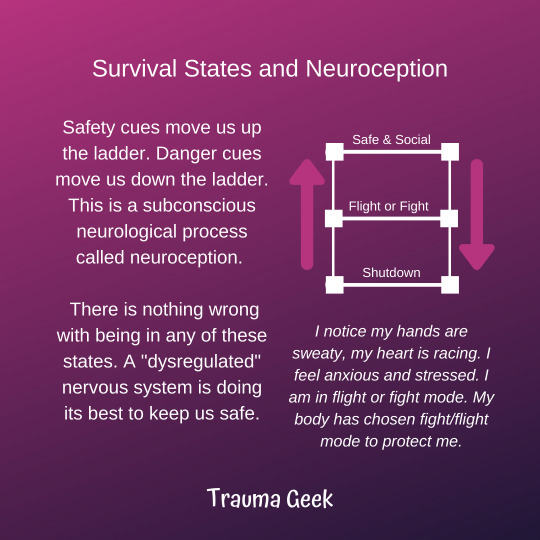
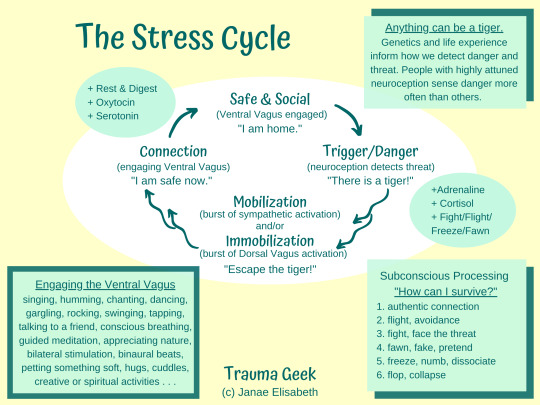


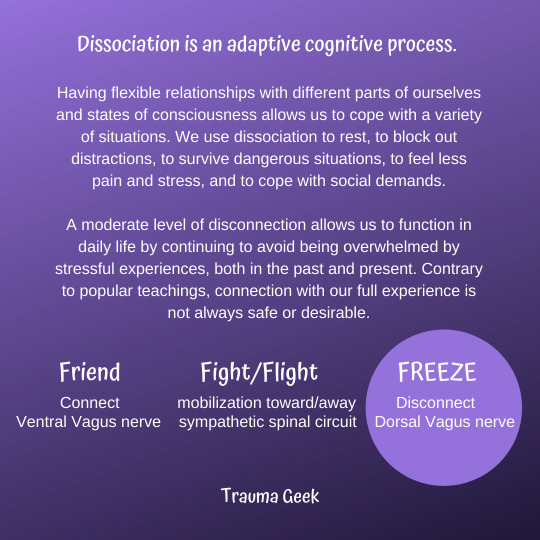




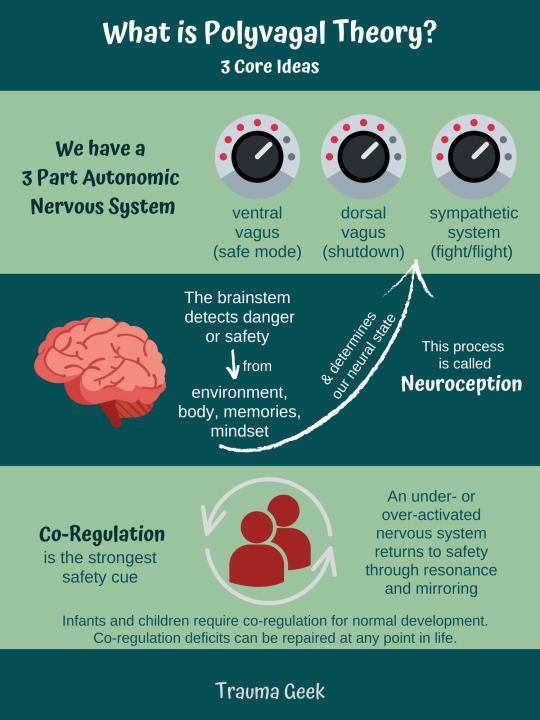
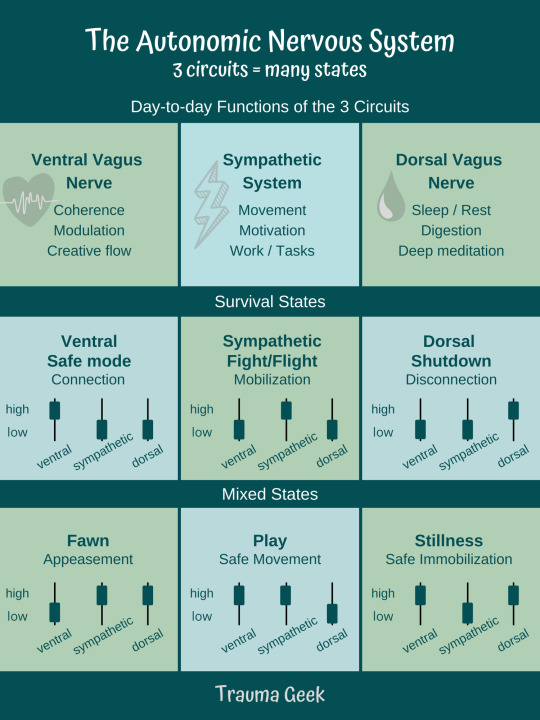
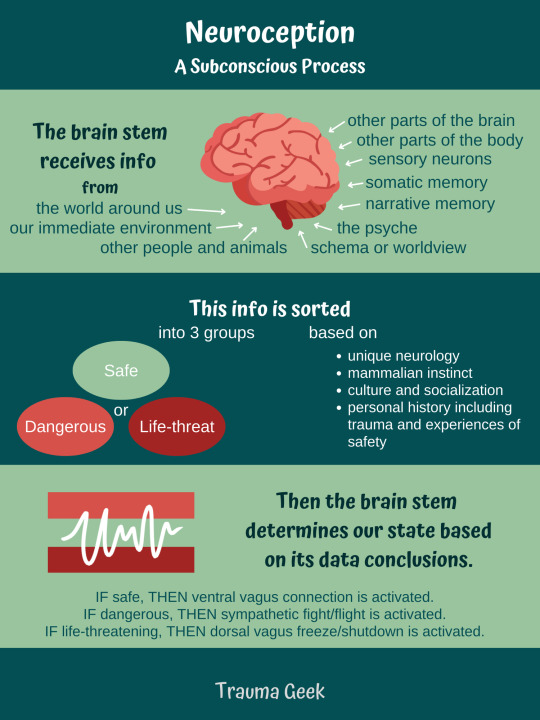


you can buy these posters! i'm trying to understand them https://www.traumageek.com/infographics
#trauma geek#stress#stress cycle#co-regulation#safety#resonance#mirroring#neuroception#nervous system#polyvagal theory#neurodiversity paradigm#autistic traits#autistic trauma#vagus nerve#dissociation#self-soothing#processing
67 notes
·
View notes
Text
The Polyvagal Theory: A Pathway to Healing
The Polyvagal Theory: A Pathway to Healing The Evolutionary Development of the Nervous System The polyvagal theory, developed by Dr. Stephen Porges, offers profound insights into how our nervous system has evolved to help us respond to safety and danger. This theory explains the role of the vagus nerve, a key component of the autonomic nervous system, in regulating our physiological and…
2 notes
·
View notes
Text
i just noticed, when i'm depressed, i dont stim as much. i wonder if this is because my nervous system is stuck in freeze mode (i'm thinking in polyvagal theory terms). i will have to do some research...
#actually autistic#autistic#autism#adult autism#stimming#depression#neurodivergent#actually neurodivergent#neurodiversity#polyvagal theory
4 notes
·
View notes
Text
"When I eventually got my Autism diagnosis, I learned that the standard human goes through a “pruning” process during their nervous system development (from birth to mid-20s) where their brain eliminates extra synapses, but studies have shown that Autistic people don’t prune as many, ending up with excess synapses. (A new theory is that the lack of pruning is the cause behind many brain-related conditions.) Coming to the realization that my brain & body are wired in a way that causes me to become overstimulated and dysregulated more than the average person, I was intrigued when I started seeing information about the Vagus Nerve and Polyvagal Theory."
#The Overstimulated#Substack#Personal Blog#Personal Experience#personal health#Disabled Writer#Disability#Disabled Experience#Disabled Blogger#Neurodiversity#Neurodivergent#Autism#Actually Autistic#ASD#Autism Spectrum Disorder#Autistic#PTSD#Trauma#CPTSD#Post Traumatic Stress Disorder#Trauma Healing#the polyvagal theory#vagus nerve#emotional regulation#emotional dysregulation#fight flight freeze fawn#co-regulation
5 notes
·
View notes
Text

Essential Oils Calm The Nervous System
A healthy vagus nerve is essential for a balanced nervous system. When the vagus nerve is underactive, it can cause problems like: Digestive issues, Feeling unsafe and stressed, Anxiety, Depression..
Medical studies: 🌸Exploring Pharmacological Mechanisms of Essential Oils on the Central Nervous System // 🌿Effects of essential oils on central nervous system: Focus on mental health // 🌲The Effects of Essential Oils on the Nervous System
#nervous system#anxiety#soothing#calming#essential oils#aromatherapy#vagus nerve#studies#feeling safe#stress relief#polyvagal theory#dorsal vagal#fight flight or freeze#fawn response#psychology#wellbeing#health
4 notes
·
View notes
Text

Ive read similar things countless times over the years but it hits differently now that im familiar with how this plays out in my body
3 notes
·
View notes
Text
The Pocket Guide to the Polyvagal Theory: The Transformative Power of Feeling Safe (Stephen Porges, 2017)
"Remember that in our contemporary society, technologies for social communication are literally being pushed on us by people who are challenged in terms of their own social communication skills and their ability to co-regulate with others.
We label this new technology social networking. We use computers. We text with a smartphone.
In a sense, we are stripping the essence of human interactions, direct face-to-face experiences, from human interactions.
We’re moving from a synchronous interactive strategy to an asynchronous one in which we leave messages and look at people later.
We are allowing the world to be organized based upon principles of individuals who have difficulty regulating their biobehavioral state in the presence of others but who may regulate well with objects.
In a very global clinical perspective, many of the disorders that therapists are actively requested to treat are about difficulties regulating state with others.
When individuals have difficulty regulating state with others or co-regulating, they adaptively gravitate to regulating state with objects.
Sometimes these tendencies lead to clinical labels. Whether it is labeled autism or social anxieties doesn’t really matter.
What we know is that these individuals’ nervous systems are not enable to engage in reciprocal social interactions.
It is rare for them to feel safe with people and get into that, beneficial physiological states that enable social behavior to support health, growth, and restoration.
For these people, social behavior is disruptive and not supportive.
Individuals may self-select into two different groups that are categorized by either regulating through social interaction or through the use of objects."
7 notes
·
View notes
Text
We updated our “Polyvagal Theory” glossary page with a selection from “A neurodiversity paradigm lens on polyvagal theory — Neurodiverse Connection”.
3 notes
·
View notes
Text
But the polyvagal theory helped us understand and explain why all these disparate, unconventional techniques worked so well.
"The Body Keeps the Score: Mind, brain and body in the transformation of trauma" - Bessel van der Kolk
#book quote#the body keeps the score#bessel van der kolk#nonfiction#polyvagal theory#vagus nerve#explanation#unconventional techniques
3 notes
·
View notes
Text
putting my recent reading to work. met with a friend for lunch. i was pissed (various) and she was anxious (various) so I insisted we go for a walk in the park, to be near trees, then i found a swing so I made her sit on it with me and we swung back and forth while we listened to traffic and eventually heard the leaves rustling and the birds moving around and we both felt much better.
6 notes
·
View notes
Text
I know this is a jokey post but please if you struggle with this, and exhaustion, sensory overwhelm, inability to calm down after stressful events, ... read a book on polyvagal theory (preferably not Porges' one, he's the original author but that's the most difficult and dense one) which has exercises. This can help you learn to see the warning signals BEFORE you crash AND give you techniques to become more resilient.
Dude when my social battery runs out there’s like no warning. I don’t get the 20% warnings it’s just I’ll be enjoying my time and then all of a sudden if one more word is spoken I’m going to kill myself and everyone around me.
46K notes
·
View notes
Text





0 notes